Connect With Us
Blog
Items filtered by date: October 2024
Why Does Pregnancy Cause Foot Pain?
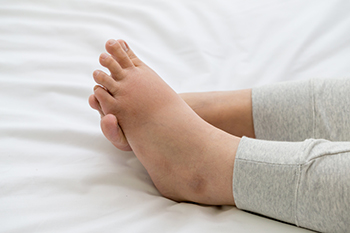
Pregnancy often brings a range of physical changes, and foot pain is a common complaint among expectant mothers. As the body prepares for childbirth, hormonal fluctuations cause ligaments to loosen, which can lead to instability in the feet and ankles. Additionally, the growing uterus increases weight and pressure on the feet, contributing to discomfort and swelling. The shift in the body's center of gravity during pregnancy can alter walking patterns, placing added stress on the feet. Edema, or swelling, commonly occurs due to fluid retention, causing feelings of heaviness and pain. Changes in foot shape, often resulting in wider and flatter feet, can also lead to discomfort. If you have developed foot pain while pregnant, it is suggested that you confer with a podiatrist who can help you to find relief during this transformative time.
Pregnant women with swollen feet can be treated with a variety of different methods that are readily available. For more information about other cures for swollen feet during pregnancy, consult with David Cain, DPM from Iowa. Our doctor will attend to all of your foot and ankle needs.
What Foot Problems Can Arise During Pregnancy?
One problem that can occur is overpronation, which occurs when the arch of the foot flattens and tends to roll inward. This can cause pain and discomfort in your heels while you’re walking or even just standing up, trying to support your baby.
Another problem is edema, or swelling in the extremities. This often affects the feet during pregnancy but tends to occur in the later stages.
How Can I Keep My Feet Healthy During Pregnancy?
- Wearing orthotics can provide extra support for the feet and help distribute weight evenly
- Minimize the amount of time spent walking barefoot
- Wear shoes with good arch support
- Wear shoes that allow for good circulation to the feet
- Elevate feet if you experience swelling
- Massage your feet
- Get regular, light exercise, such as walking, to promote blood circulation to the feet
If you have any questions please feel free to contact our office located in Ames, Iowa . We offer the newest diagnostic and treatment technologies for all your foot and ankle needs.
Prevention and Treatment of Diabetic Foot Ulcers
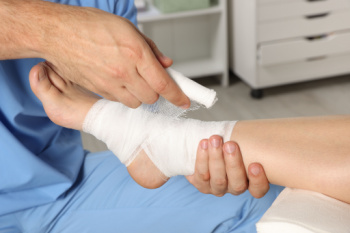
Diabetic foot ulcers are a significant risk for people with diabetes, often leading to severe complications if not properly managed. These ulcers are open sores or wounds that usually occur on the bottom of the feet, caused by a combination of poor circulation and nerve damage, common in diabetic patients. Prevention is key in managing this risk. Daily foot inspections, maintaining proper foot hygiene, and wearing well-fitted shoes can help prevent ulcers. Managing blood sugar levels also plays a vital role in prevention. For those who develop foot ulcers, early treatment is critical. This includes cleaning and dressing the wound, controlling infection, and using custom orthotics or special footwear to alleviate pressure on the affected area. In more severe cases, surgical interventions may be necessary. If you have diabetes, and develop a foot ulcer, it is strongly suggested that you include a podiatrist on your health care team for routine care of your feet.
Wound care is an important part in dealing with diabetes. If you have diabetes and a foot wound or would like more information about wound care for diabetics, consult with David Cain, DPM from Iowa. Our doctor will assess your condition and provide you with quality foot and ankle treatment.
What Is Wound Care?
Wound care is the practice of taking proper care of a wound. This can range from the smallest to the largest of wounds. While everyone can benefit from proper wound care, it is much more important for diabetics. Diabetics often suffer from poor blood circulation which causes wounds to heal much slower than they would in a non-diabetic.
What Is the Importance of Wound Care?
While it may not seem apparent with small ulcers on the foot, for diabetics, any size ulcer can become infected. Diabetics often also suffer from neuropathy, or nerve loss. This means they might not even feel when they have an ulcer on their foot. If the wound becomes severely infected, amputation may be necessary. Therefore, it is of the upmost importance to properly care for any and all foot wounds.
How to Care for Wounds
The best way to care for foot wounds is to prevent them. For diabetics, this means daily inspections of the feet for any signs of abnormalities or ulcers. It is also recommended to see a podiatrist several times a year for a foot inspection. If you do have an ulcer, run the wound under water to clear dirt from the wound; then apply antibiotic ointment to the wound and cover with a bandage. Bandages should be changed daily and keeping pressure off the wound is smart. It is advised to see a podiatrist, who can keep an eye on it.
If you have any questions, please feel free to contact our office located in Ames, Iowa . We offer the newest diagnostic and treatment technologies for all your foot care needs.
What to Do About a Bunion
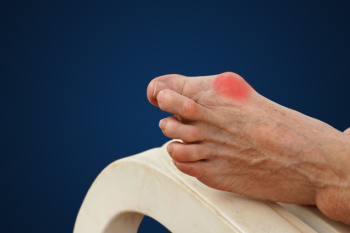
Bunions are bony bumps that form at the base of the big toe, where the joint becomes enlarged and misaligned. This condition often causes the big toe to lean toward the other toes, resulting in discomfort, swelling, and redness surrounding the joint. Symptoms include pain, difficulty wearing shoes, and stiffness, especially during walking or standing. Over time, bunions can lead to other foot issues, such as calluses, hammertoes, or arthritis. Bunions are caused by factors like genetics, wearing improper footwear, and foot stress from conditions like flat feet. Prevention involves wearing properly fitted shoes with enough room for toes to move. Treatment options range from non-invasive methods like orthotics to surgical correction for more severe cases. Early intervention helps prevent progression and improves quality of life. If you have an uncomfortable and painful bunion, it is suggested that you schedule an appointment with a podiatrist for a diagnosis and treatment individualized to you.
If you are suffering from bunions, contact David Cain, DPM of Iowa. Our doctor can provide the care you need to keep you pain-free and on your feet.
What Is a Bunion?
A bunion is formed of swollen tissue or an enlargement of boney growth, usually located at the base joint of the toe that connects to the foot. The swelling occurs due to the bones in the big toe shifting inward, which impacts the other toes of the foot. This causes the area around the base of the big toe to become inflamed and painful.
Why Do Bunions Form?
Genetics – Susceptibility to bunions are often hereditary
Stress on the feet – Poorly fitted and uncomfortable footwear that places stress on feet, such as heels, can worsen existing bunions
How Are Bunions Diagnosed?
Doctors often perform two tests – blood tests and x-rays – when trying to diagnose bunions, especially in the early stages of development. Blood tests help determine if the foot pain is being caused by something else, such as arthritis, while x-rays provide a clear picture of your bone structure to your doctor.
How Are Bunions Treated?
- Refrain from wearing heels or similar shoes that cause discomfort
- Select wider shoes that can provide more comfort and reduce pain
- Anti-inflammatory and pain management drugs
- Orthotics or foot inserts
- Surgery
If you have any questions, please feel free to contact our office located in Ames, Iowa . We offer the newest diagnostic and treatment technologies for all your foot care needs.
Struggling with Diabetic Foot Ulcers?
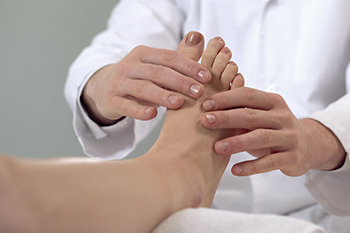
By offering treatments such as Hyperbaric Oxygen Therapy, Debridement, Offloading, Specialty Dressings, and more, we provide not just hope but a comprehensive approach to healing for those suffering from non-healing foot and leg wounds.
See if advanced wound care is right for you - Request an appointment today!
Medical Causes and Symptoms of Swollen Feet
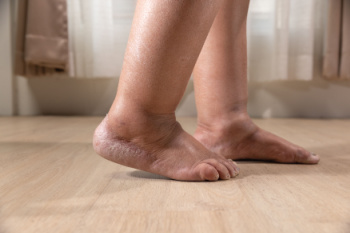
Foot swelling, medically known as edema, occurs when excess fluid accumulates in the tissues of the feet. This condition can arise from various medical reasons, including heart failure, kidney disease, and venous insufficiency, where blood flow is impaired. It can also result from injuries, infections, or certain medications. Symptoms of foot swelling include noticeable puffiness, increased circumference of the foot, and discomfort or tightness in the affected area. In some cases, the swelling may be accompanied by pain or difficulty in movement. Identifying the underlying cause is vital for effective treatment and management. If your feet have become swollen, it is suggested that you confer with a podiatrist who can determine the cause and offer relief and treatment options.
Swollen feet can be a sign of an underlying condition. If you have any concerns, contact David Cain, DPM of Iowa. Our doctor can provide the care you need to keep you pain-free and on your feet.
Swollen feet are a common ailment among pregnant women and people who stand or sit for extended periods. Aging may increase the possibility of swollen feet and patients who are obese often notice when their feet are swelling too. There may be medical reasons why swollen feet occur:
- Phlebitis - A condition that causes the veins to become inflamed and can also cause leg pain.
- Liver disease - This may lead to low blood levels of albumin which is a protein. This can cause fluid in the blood to pass into the tissues and several areas of the body can become swollen.
- Heart failure - When the heart doesn’t pump properly the blood that is normally pumped back to the heart can pool in the veins of the legs causing swollen feet.
- Kidney disease - One of the main functions of the kidneys is releasing excess fluid in the body. This type of condition can make it difficult for the kidneys to function properly, and as a result the feet may become swollen.
- Deep-vein thrombosis (DVT)- This is a serious condition where blood clots form in the veins of the legs. They can block the return of blood from the legs to the heart which may cause the feet to swell. It is important to be treated by a podiatrist if this condition is present.
Swollen feet can also be caused by bone and tendon conditions, including fractures, arthritis, and tendinitis. Additionally, there may be skin and toenail conditions and an infection may cause the feet to swell. Patients who take medicine to treat high blood pressure may be prone to getting swollen feet.
Many patients elevate their feet to help relieve the swelling and this is generally a temporary remedy. When a podiatrist is consulted the reason behind the swelling can be uncovered and subsequently treated.
If you have any questions please feel free to contact our office located in Ames, Iowa . We offer the newest diagnostic tools and technology to treat your foot and ankle needs.
